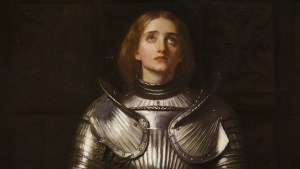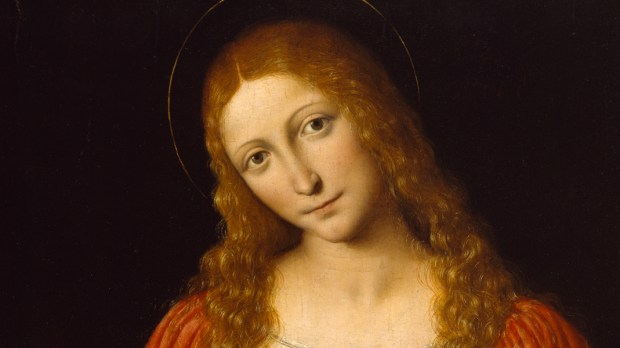March 8 is International Women’s Day, and March is celebrated as Women’s History Month in the United States. In a Church that is often perceived as dominated by men, there is much to celebrate when it comes to the achievements and contributions of women—and not just the Mother of God. The following saints were pioneers, the first women (or first people) to do something remarkable in Christian history. Through their intercession, may we honor the accomplishments of women and girls and support them as they pursue greatness (and holiness).
First witness to the Resurrection: St. Mary Magdalene (1st century)
Famously known as “the Apostle to the Apostles,” St. Mary Magdalene was the companion of Jesus out of whom he had cast seven demons. When the Twelve abandoned him, Mary Magdalene remained steadfast, accompanying him on the Via Dolorosa and standing at the foot of the Cross as he died. Devastated by his death, Mary remained outside the tomb weeping. When she returned Easter Sunday morning to do the same, she found the tomb empty and ran to get the apostles. Peter and John examined the tomb and then left, leaving Mary to encounter the Risen Christ in the garden, to hear the good news of his resurrection and be sent to bear this good news to the men who would take it to the ends of the earth.

Read more:
Interview: What happens when you meet Mary Magdalene in Magdala?
First Christian European: St. Lydia Purpuraria (1st century)
St. Lydia was a wealthy dealer of purple cloth, who heard St. Paul preach in Philippi in Acts 16—the first time he preached in Europe. Lydia was baptized along with her household, in the first documented conversion of any European. Lydia then provided hospitality to St. Paul and his companions.
First female martyr: St. Thecla (1st century)
Though not found in the Bible, the story of St. Thecla (a disciple of St. Paul) is an ancient one. Having heard Paul preach, Thecla vowed herself to virginity. The anger of her fiancé led to Thecla’s condemnation to death, but she was miraculously saved. After this drama, Thecla became (with Paul’s blessing) a traveling, miracle-working preacher until her martyrdom at the hands of doctors who were jealous of her gift of healing. In the East, Thecla is known as Equal to the Apostles and Protomartyr among Women. (The Roman Church has removed her from the calendar for lack of evidence of her historicity, but she continues to be revered in Eastern Catholicism.)
First female Christian writer: St. Perpetua (182-203)
St. Perpetua is famous for her early martyrdom alongside her slave St. Felicity. Unlike most ancient martyrs, we have far more than a legend of these two. In fact, the detailed account of their imprisonment was written by Perpetua herself (though the description of the martyrdom itself was, naturally, added by another witness). Not only the oldest text by a Christian woman, this account of their passion is one of the oldest Christian texts still extant.
First woman to convert an entire nation: St. Nina (Nino) of Georgia (296-338)
Only about 25 years after the educated and well-connected St. Gregory the Illuminator converted Armenia (the first Christian nation), a slave girl named Nina repeated the feat in nearby Georgia. The lone Christian in a pagan household, Nina did her duty well and was known to be pious and virtuous. Her example was already spreading the Gospel when word got out that her prayers had healed a dying child. Nana, the ailing queen of Georgia, invited Nina to visit her and repeat this miracle. In great humility, Nina sent back a response insisting that she was only a slave girl and had no right to appear before the queen. Nana had her attendants take her to Nina instead and was healed as soon as Nina began praying. The queen was converted, but the king remained skeptical until he was in great danger while hunting. He prayed “to the God whom Nina worships” and was saved—and converted—in that moment. After that, the entire country converted; for her efforts, Eastern Christianity calls Nina Equal to the Apostles and Enlightener of Georgia.
First woman canonized by the Holy See: St. Wiborada (d. 926)
Though men and women have been sainted through various local processes since the early centuries of Christianity, a centralized canonization process dates only to the beginning of the second millennium. The first saint canonized by Rome for universal veneration was St. Ulrich of Augsburg, whom St. Wiborada advised when he was young. Fifty years later, Wiborada herself was raised to the altars. A Swiss hermit and prophet, Wiborada was the bookbinder for a nearby monastery. She foretold a coming invasion of Hungarian forces and urged the monks to save the most precious manuscripts by fleeing with them. But Wiborada refused to abandon her post (or her books) and was martyred. The patron saint of librarians, she’s depicted with a book in one hand and a battle-axe (the instrument of her martyrdom) in the other.

Read more:
First female winner of Ratzinger Prize to write Vatican’s Good Friday ‘Via Crucis’ meditations

Read more:
Power in the Church? Women Have Always Had It

Read more:
This year is 50th anniversary of first women being named Doctors of the Church

